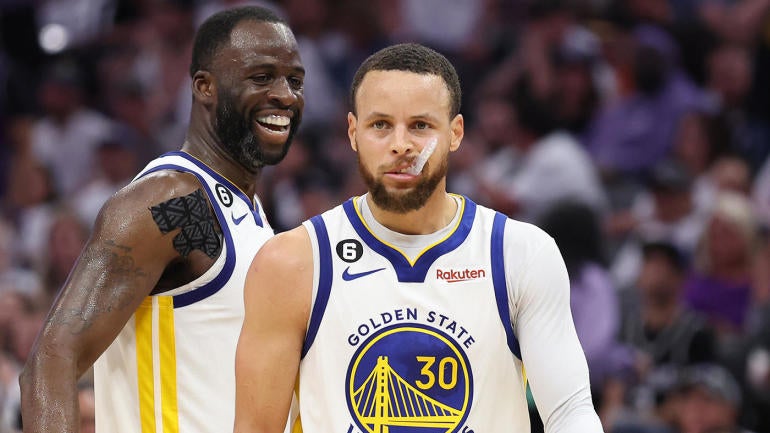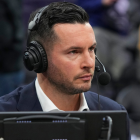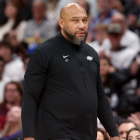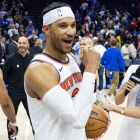
SACRAMENTO -- You can judge a Golden State Warriors performance from the groans you hear from opposing fans. Usually they originate from an impossible, backbreaking 3-pointer from Steph Curry or Klay Thompson. Or a devastating back-door cut and thunderous dunk from Andrew Wiggins or Jonathan Kuminga.
But in Sunday's dominant 120-100 Game 7 win to eliminate the Sacramento Kings and advance to the Western Conference semifinals against the Los Angeles Lakers, Kings fans' loudest, most frustrating grunts, aches and complaints came when Kevon Looney -- with his feet seemingly never leaving the floor -- collected offensive rebound after offensive rebound to exasperate and wear down Sacramento to the point of brutality.
"That's what makes it fun," Looney said after the win. "Doing all the hard work, pushing and shoving, getting hit with elbows, and things like that, all for that moment to be able to get an assist for your team and see them make a shot and change the momentum. It's just a great feeling, and I know it helps us win, so I live for those moments."
Curry's 50-point performance -- the first-ever in an NBA Game 7 -- was truly a work of art, but it was an illustrious Michelangelo fresco in a room full of sloppy kindergarten finger paintings. Thompson went 4 for 19. Andrew Wiggins went 5 for 16. As a team, they shot 63 percent from the free throw line. Warriors with surnames other than Curry were 8 for 28 from 3-point range.
After a back-and-forth first half, the Warriors won the game in a slog of a third quarter marked by ogreish physicality, horrific free throw shooting and nine missed shots in the paint from Golden State alone.
In the first six minutes of the third quarter, the Warriors went 5 for 16 from the field and 3 for 9 from the free throw line. And yet, thanks to nine offensive rebounds over that stretch, five by Looney, the Warriors found themselves on a 15-6 run. At various stages of the series, particularly Game 6, the Kings were the aggressors -- continuing to preach hitting first. In the third quarter of Game 7, they were hit with such a flurry of body blows, both literally and figuratively, that they simply couldn't recover.
"Although we were missing free throws, just the fact that we were being physical and getting to the line, it's demoralizing for the defense," Thompson said.
The irony isn't lost on anyone who's watched the Warriors during this unfathomable run over the past decade. Their quick-hitting, read-and-react, fast-paced offense has been unparalleled in both its beauty and effectiveness. They have speed, shooting, passing and the unearthly synergy of Curry, Thompson, Looney and Draymond Green -- yet here they were in Game 7 mucking things up in the trenches.
That's because the Kings, with a coaching staff extremely familiar with the system, had discovered how to out-Warrior the Warriors.
Golden State wants to play fast. Sacramento wants to play faster. The Warriors want to shoot 3s. The Kings want to shoot more 3s. Steve Kerr's system breeds offensive efficiency. Mike Brown's offense was the best in NBA history. At the close of the series, Looney said the Sacramento offense was "what it was hyped up to be," and Kerr was just as effusive with his praise.
"They have a really fun team, a beautiful offense," Kerr said of Sacramento after Game 7. "They did a great job of putting a system in place that maximized their talent. It was beautiful to watch them play this year."
For many games in this series, the Kings ran the ball down the Warriors throats, forcing them into a track meet that all too often resulted in a surplus of Golden State turnovers. So in Game 7, they made a concerted effort to ensure that when they ran, it was discerning and with purpose. That led to fewer high-risk, home-run passes, more pick-and-roll-based, organized offense, and a whole lot of half-court Steph Curry wizardry.
Curry took 38 shots, the most he's ever hoisted in a playoff game, and that was no accident. The Warriors created much more spacing than they did in Game 6, and encouraged Curry to use it in the way that only he can.
"When you see something that works, you'd be a fool not to stick with it," Green said after the game. "When Steph gets the ball, he slows it down, he's trying to get to something. And every time we did it, we got to what we wanted to get to."
In the first six games of the series, the Warriors and Kings played at a pace of 105 possessions per game, by far the fastest of any 2023 postseason matchup. In Game 7, Golden State slowed the pace to 97.5 -- nearly as deliberate as the rough-and-tumble Knicks-Heat Game 1 that was played just before them.
The Warriors allowed just 100 points, 42 in the second half, to a Kings team that had averaged 116 for the series. It's a glaring example of Golden State's ability to play multiple styles -- a crucial, yet sometimes overlooked, ingredient to their incredible success over the past decade.
Game 7 was a great proof-of-concept that the Warriors, the league's fastest-paced team, can also win by slowing things down a bit. That could bode well against a Lakers team that was just behind Golden State in pace, but also possesses one of the most surgical half-court offensive minds in basketball history in LeBron James. Either way the Warriors will have their hands full, but Sunday was a forceful reminder that as pretty as Warriors basketball is, they're not afraid to get ugly if that's what it takes to win.
"The offense is flashy, especially the way that we play. We kind of have that high-octane offense," Curry said. "But for us, our calling card has usually been our defense. We can start to feel the momentum stay on your side even if shots aren't falling because you can put two, three stops together and kind of take the momentum away."






















